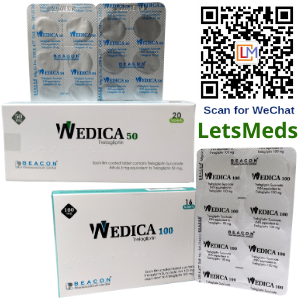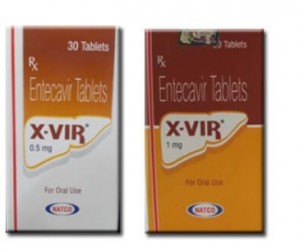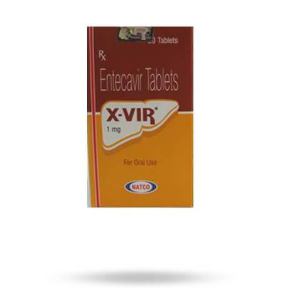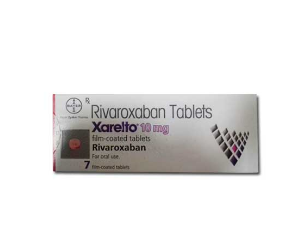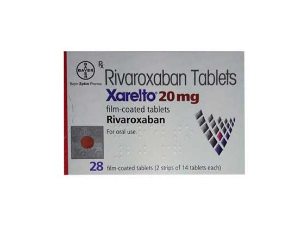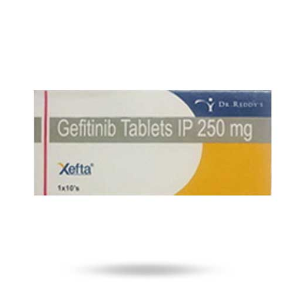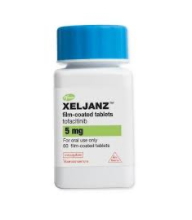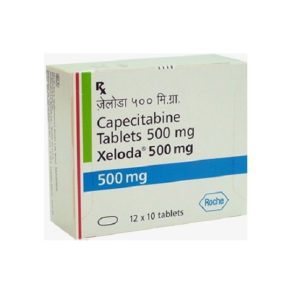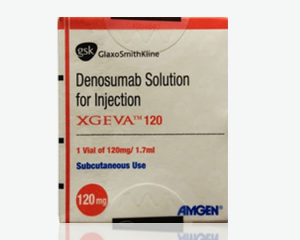-
-
-
-
( reviews)
X-VIR – Entecavir Tablets
$50.00Natco Entecavir Details:
Brand Name : X-VIR
Contents : Entecavir
Strengths available : 0.5mg / 1mg
Manufacturer : Natco Pharma Ltd -
( reviews)
X-VIR Entecavir 1 mg Tablets
$50.00ABOUT X-VIR Tablets
X-VIR is an antiviral that belongs to a class of drugs known
as hepatitis B virus nucleoside reverse transcriptase inhibitors.Entecavir is an antiviral medication.
Entecavir prevents certain virus cells from multiplying in your body. It
works by blocking the DNA synthesis in hepatitis B virus, a process essential
for the virus to grow and multiply. Entecavir thus stops the virus from
spreading in the body. It does not prevent spread of HBV infections to other
people.MEDICINALUSES
X-VIR is used to treat long-term hepatitis B infection.
Hepatitis B is an infection of the liver caused by the hepatitis B virus.
Long-term infection can cause liver damage, rarely liver cancer, and liver
failure. Entecavir helps to decrease the amount of hepatitis B virus in your
body.Entecavir
is used to treat long-term infection of the liver (hepatitis) caused by
hepatitis B virus (HBV). It is also used to prevent HBV reinfection after liver
transplant and to treat HIV patients infected with HBV. Entecavir can be used
in individuals with damaged liver that still functions properly (compensated
liver disease) and in individuals with damaged liver that does not function
properly (decompensate liver disease).X-VIR Tablets Side Effects:
Side Effects Of Entecavir
Include Weakness, Dizziness, Tiredness, Headache, Fatigue, Nausea, Vomiting,
Irregular Heart Beat, Light Headedness, Stomachache, Muscle Pain, Cold Legs,
Loss Of Appetite, Yellow Discolortaion Of Skin And Urine, Light-Colored Bowel
Movements, Difficulty Breathing, Dizziness. Serious Adverse Effects Include
Lactic Acidosis.Raised liver enzymes. Blood or sugar in the
urine. Headache. Upset stomach or throwing up. Many small meals, good mouth
care, sucking hard, sugar-free candy, or chewing sugar-free gum may help. Loose
stools (diarrhea). Feeling dizzy. Rise slowly over a few minutes when sitting
or lying down. Be careful climbing.Allergy
Diarrhoea
Elevated Liver Enzymes
Insomnia
Fatigue
Headache
Dizziness
X-VIR Tablets Precautions:
X Vir 1mg Tablet prevents
the multiplication of HIV virus in human cells. Thus stops the HIV virus from
producing new viruses.Do
not discontinue taking entecavir without your doctor’s advice.Entecavir
should be taken on an empty stomach. Please follow the instructions of your
doctor.Do
consult your doctor before taking entecavir, if you are pregnant or planning to
become pregnant. Do consult your doctor before taking entecavir, if you are
breast-feeding.Do
not drive or operate machines if you feed dizzy, tired or sleepy after taking
entecavir.Do
consult your doctor before taking entecavir if you have Kidney disease, any
other liver disease or a liver transplant.X-VIR Tablets INTERACTIONS:
Do not use X VIR 1 mg Tablet for any
conditions other than those specified by the doctor. Do not share the medicine
with anyone else. Report to the doctor all your medical conditions and current
medicines before taking this medication. Report any undesired effects or lack
of improvement to the doctor on priority.Consult
your doctor before taking entecavir, if you have AIDS or HIV (human
immunodeficiency virus) infection. Tests for HIV should be performed before
taking entecavir in suspected individuals.Inform
your doctor, if you have taken medicines containing active drug lamivudine
(Epivir, Epzicom, and Trizivir) or telbivudine. Inform your doctor about all
medications you have received in the past for treatment of hepatitis B.Worsening
of hepatitis B may occur while taking entecavir and upon discontinuation. Liver
function tests must be conducted while on treatment and upon discontinuation.Immediately
report symptoms such as nausea, vomiting and stomach pain to your doctor. These
might indicate development of a life-threatening side effect of entecavir
called lactic acidosis (excess lactic acid in blood). Lactic acidosis occurs
more often in women, particularly if they are very overweight. -
( reviews)
Xarelto Rivaroxaban 10 mg Tablets
$50.00WHAT IS XARELTO TABLETS?
Rivaroxaban is a direct factor Xarelto inhibitor. It works by blocking the formation of blood clots.
USES OF XARELTO TABLETS:
Rivaroxaban is used to prevent or treat a type of blood clot called deep vein thrombosis (DVT), which can lead to blood clots in the lungs (pulmonary embolism). A DVT can occur after certain types of surgery. It is also used in people with atrial fibrillation (a heart rhythm disorder) to lower the risk of stroke caused by a blood clot.
POSSIBLE SIDE EFFECTS:
This medication can cause serious bleeding if it affects your blood clotting proteins too much. Tell your doctor right away if you have any signs of serious bleeding, including: unusual pain,swelling,discomfort, unusual bruising, prolonged bleeding from cuts or gums, persistent,frequent nosebleeds, unusually heavy,prolonged menstrual flow, pink,dark urine, coughing up blood, vomit that is bloody or looks like coffee grounds, severe headache, dizziness,fainting, unusual or persistent tiredness,weakness, bloody,black,tarry stools, difficulty swallowing.
COMMON SIDE EFFECTS MAY INCLUDE:
A very serious allergic reaction to this drug is rare. However, get medical help right away if you notice any symptoms of a serious allergic reaction, including: rash, itching/swelling (especially of the face,tongue,throat), severe dizziness, trouble breathing.
DRUGS PRECAUTIONS:
Before using this medication, tell your doctor or pharmacist your medical history, especially of: liver disease, kidney disease, bleeding problems (such as bleeding of the stomach/intestines, bleeding in the brain), stroke, recent major injury,surgery, blood disorders (such as anemia, hemophilia, thrombocytopenia), frequent falls,injuries, certain eye problem (retinopathy), certain hereditary enzyme problems (such as galactose intolerance, Lapp lactase deficiency, glucose-galactose malabsorption).
It is important that all your doctors and dentists know that you take rivaroxaban. Before having surgery or any medical/dental procedures, tell your doctor or dentist that you are using this medication.
DRUGS INTERACTIONS:
Drug interactions may change how your medications work or increase your risk for serious side effects. This document does not contain all possible drug interactions. Keep a list of all the products you use (including prescription/nonprescription drugs and herbal products) and share it with your doctor and pharmacist. Do not start, stop, or change the dosage of any medicines without your doctor’s approval.
Some products that may interact with this drug include: mifepristone, certain antidepressants(including SSRIs such as fluoxetine, SNRIs such as desvenlafaxine/venlafaxine).
Other medications can affect the removal of rivaroxaban from your body, which may affect how rivaroxaban works. Examples include cobicistat, conivaptan, certain azole antifungals (itraconazole, ketoconazole, posaconazole), rifamycins (such as rifampin), HIV protease inhibitors (such as lopinavir, ritonavir), St. John’s wort, drugs used to treat seizures (such as carbamazepine, phenytoin, phenobarbital), among others.
-
( reviews)
Xarelto Rivaroxaban 20 mg Tablets
$50.00WHAT IS XARELTO TABLETS?
Rivaroxaban is a direct factor Xarelto inhibitor. It works by blocking the formation of blood clots.
USES OF XARELTO TABLETS:
Rivaroxaban is used to prevent or treat a type of blood clot called deep vein thrombosis (DVT), which can lead to blood clots in the lungs (pulmonary embolism). A DVT can occur after certain types of surgery. It is also used in people with atrial fibrillation (a heart rhythm disorder) to lower the risk of stroke caused by a blood clot.
POSSIBLE SIDE EFFECTS:
This medication can cause serious bleeding if it affects your blood clotting proteins too much. Tell your doctor right away if you have any signs of serious bleeding, including: unusual pain,swelling,discomfort, unusual bruising, prolonged bleeding from cuts or gums, persistent,frequent nosebleeds, unusually heavy,prolonged menstrual flow, pink,dark urine, coughing up blood, vomit that is bloody or looks like coffee grounds, severe headache, dizziness,fainting, unusual or persistent tiredness,weakness, bloody,black,tarry stools, difficulty swallowing.
COMMON SIDE EFFECTS MAY INCLUDE:
A very serious allergic reaction to this drug is rare. However, get medical help right away if you notice any symptoms of a serious allergic reaction, including: rash, itching/swelling (especially of the face,tongue,throat), severe dizziness, trouble breathing.
DRUGS PRECAUTIONS:
Before using this medication, tell your doctor or pharmacist your medical history, especially of: liver disease, kidney disease, bleeding problems (such as bleeding of the stomach/intestines, bleeding in the brain), stroke, recent major injury,surgery, blood disorders (such as anemia, hemophilia, thrombocytopenia), frequent falls,injuries, certain eye problem (retinopathy), certain hereditary enzyme problems (such as galactose intolerance, Lapp lactase deficiency, glucose-galactose malabsorption).
It is important that all your doctors and dentists know that you take rivaroxaban. Before having surgery or any medical/dental procedures, tell your doctor or dentist that you are using this medication.
DRUGS INTERACTIONS:
Drug interactions may change how your medications work or increase your risk for serious side effects. This document does not contain all possible drug interactions. Keep a list of all the products you use (including prescription/nonprescription drugs and herbal products) and share it with your doctor and pharmacist. Do not start, stop, or change the dosage of any medicines without your doctor’s approval.
Some products that may interact with this drug include: mifepristone, certain antidepressants(including SSRIs such as fluoxetine, SNRIs such as desvenlafaxine/venlafaxine).
Other medications can affect the removal of rivaroxaban from your body, which may affect how rivaroxaban works. Examples include cobicistat, conivaptan, certain azole antifungals (itraconazole, ketoconazole, posaconazole), rifamycins (such as rifampin), HIV protease inhibitors (such as lopinavir, ritonavir), St. John’s wort, drugs used to treat seizures (such as carbamazepine, phenytoin, phenobarbital), among others.
-
-
( reviews)
Xefta 250 mg Gefitinib Tablets
$50.00ABOUT XEFTA
Xefta
250 mg Tablet helps to relieve the extreme pain and discomfort suffered by
patients of breast or lung cancers. It slows down the production of cancer cells,
thereby inhibiting the spread of the malignant tissues. It can be administered
orally with or without food.MEDICINAL USES:
Xefta 250 mg Tablet is an anticancer medicine which is used
in the treatment of cancer of the lungs. It should only be used under the
supervision of a qualified physician. This medicine is not recommended for use
in patients with lung and liver diseases.Xefta 250mg Tablet is
used in the treatment of non-small
cell lung cancer.
It is used in patients in which it has spread to other parts
of the body, who have abnormal epidermal growth factor receptor (EGFR) genes,
and who have not had previous treatment for cancer.Xefta Tablet is used for Treatment
of metastatic non-small cell lung cancer in tumors with epidermal growth factor
receptor exon 19 deletions or exon 21 substitution mutations and other conditions. Xefta Tablet may also be used
for purposes not listed in this medication guide.Xefta Tablet
contains Gefitinib as an active ingredient.Xefta Tablet works by
blocking signalling of epidermal growth factor receptor dependent
proliferation.Dr
Reddy’s Labs manufactures Xefta
Tablet.XEFTA SIDE EFFECTS:
Xefta Tablet is used for the treatment,
control, prevention, & improvement of the following diseases, conditions
and symptoms:
Treatment
of metastatic non-small cell lung cancer in tumors with epidermal growth factor
receptor exon 19 deletions or exon 21 substitution mutations.Xefta Tablet may
also be used for purposes not listed here.Nausea
Rash
Vomiting
Weakness
Loss of appetite
Dry skin
Diarrhoea
Stomatitis (Inflammation of the
mouth).XEFTA PRECAUTIONS:
Before using Xefta Tablet,
inform your doctor about your current list of medications, over the counter
products (e.g. vitamins, herbal supplements, etc.), allergies, pre-existing
diseases, and current health conditions (e.g. pregnancy, upcoming surgery,
etc.). Some health conditions may make you more susceptible to the side-effects
of the drug. Take as directed by your doctor or follow the direction printed on
the product insert. Dosage is based on your condition. Tell your doctor if your
condition persists or worsens. Important counseling points are listed below.Avoid concomitant use of
this drug with proton pump inhibitorsContact doctor for new
onset or worsening of pulmonary symptoms such as dyspnea, cough and feverContact doctor for
severe or persistent diarrheaContact doctor if developing
eye symptoms, lacrimation, light sensitivity, blurred vision, eye pain, red
eye, or changes in visionDiscontinue
breast-feeding during treatment with this drugIf treatment with a
proton-pump inhibitor is required, take this drug 12 hours after the last dose
or 12 hours before the next dose of the proton-pump inhibitor. -
( reviews)
XELJANZ Tofacitinib Citrate Tablets
$50.00About Xeljanz
Xeljanz (tofacitinib) works by blocking certain enzymes in the body that affect immune system function. tofacitinib Xeljanz is used to treat moderate to severe rheumatoid arthritis in adults who have tried methotrexate without successful treatment of symptoms.
Xeljanz work:
Xeljanz is a JAK inhibitor. JAKs are enzymes that work within the immune system and other cells to transmit signals that influence basic cell functions. By inhibiting JAKs in immune cells, Xeljanz can interfere with the immune processes in RA
-
-
( reviews)
Xgeva 120 mg Injection, Denosumab
$50.00WHAT
IS XGEVA INJECTION?Xgeva is a monoclonal antibody that works as a RANK ligand
(RANKL) inhibitor. This medication is classified as a “bone-modifying
agent”. Monoclonal antibodies are made to target and destroy only certain
cells in the body. This may help to protect healthy cells from damage.USES OF XGEVA INJECTION:
Denosumab is used to prevent bone fractures and other
skeletal conditions in people with tumors that have spread to the bone. It is
also used to treat giant cell bone tumor in adults and teenagers with fully
matured bone structure. It is also used to treat high blood levels of calcium
caused by cancer, when other medicines such as pamidronate or zoledronic acid
have been used without success.POSSIBLE
SIDE EFFECTS:Along with its needed effects, denosumab
(the active ingredient contained in Xgeva) may cause some unwanted effects. Although not all of these
side effects may occur, if they do occur they may need medical attention.Get emergency medical help if you have any of these signs of an allergic
reaction: itching, rash, hives; difficult breathing; feeling like you might
pass out; swelling of your face, lips, tongue, or throat.COMMON SIDE EFFECTS MAY INCLUDE:
A side effect is an unwanted response to
a medication when it is taken in normal doses. Side effects can be mild or
severe, temporary or permanent.
The side effects listed below are not experienced by everyone
who takes this medication. If
you are concerned about side effects, discuss the risks and benefits of this
medication with your doctor.
The following side effects have been reported by at least 1%
of people taking this medication. Many of these side effects can be managed,
and some may go away on their own over time.DRUGS PRECAUTIONS:
This
medication may cause infections that in some cases are serious and require
hospitalization. Contact your doctor at once if you develop signs of an
infection such as fever, abdominal pain, earache, painful urination, or blood
in the urine, or if you notice a red, swollen, or tender area on the skin.
People who are taking medications that suppress the immune system (e.g.,
prednisone, azathioprine, anticancer medications) or who have a suppressed
immune system may be more at risk of developing infections.Denosumab
may cause problems with your upper or lower jaw. You may be at a higher risk of
these problems if you have cancer that has spread to the bones, are taking
certain medications (e.g., prednisone, anticancer medications), are having
radiation treatments, have poor oral hygiene, or are having a tooth extracted.
Your doctor may recommend that you see a dentist before starting this
medication. It is important to practice good oral hygiene while taking this
medication.DRUGS INTERACTIONS:
His safety and effectiveness
of using this medication have not been established for children. Denosumab is
only recommended for adolescents with giant cell tumour of bone whose bones
have stopped growing. Denosumab has not been studied in children and
adolescents with other cancers that have spread to bone.
Tell your doctor or
prescribe about all prescription, over-the-counter (non-prescription), and
herbal medications you are taking. Also tell them about any supplements you
take. Since caffeine, alcohol, the nicotine from cigarettes, or street drugs
can affect the action of many medications, you should let your prescribe know
if you use them.
WhatsApp / Viber
Available On All Major Platform
+91 7428091874
Express Worldwide Shipping
Order Above $99


